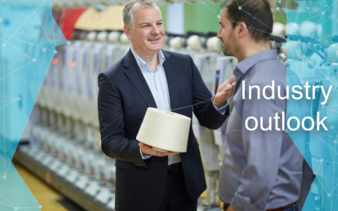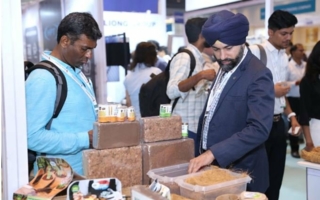25/03/2024 – Survey 2024 — auf Deutsch lesen
Gebr. Otto Baumwollfeinzwirnerei GmbH + Co. KG
The start of the new year 2024 has been rough. The stocks in the textile pipeline, all the way to the retail stores, are still available in larger quantities.
We anticipate a noticeable upturn in demand in the course of the first half of the year, as inventories will be depleted sooner or later. We are convinced that regional manufacturers with short distances and fast delivery times will be the first to benefit from a revival.
The trend towards sustainable and intelligent textiles continues unabated. We therefore expect volume growth in intelligent niche products to continue.
We expect new impetus from new recycling concepts, especially since the circular economy is likely to become THE mega topic of the coming years.
We see great market potential in the circular economy/recycling. After all, one of the largest "cotton fields" is located directly in Germany: namely our enormous mountain of used textiles. According to the Federal Statistical Office, around 176,200 t of textile and clothing waste were collected from private households in 2021.
Together with the ITA Recycling Atelier in Augsburg, our goal is to show new ways to develop high-quality yarns from these used textiles in Germany.
We see another mega issue in the replacement of disposable products with reusable products. Together with Kelheim Fibers, Otto Yarns is presenting a concept for an innovative, high-performance period panty at Techtextil. We are sure that reusable products can and will gradually establish themselves - especially in the hygiene sector as well as in other areas.
The third big issue we see is certified organic products, i.e. made from organic and fair trade cotton, as well as hemp and kapok cotton blends. These will continue to occupy a stable and slightly growing market share. In our ‘sustainable concepts’ division, we at Gebr. Otto offer a wide range of sustainable product concepts. Our current developments – hemp from Germany combined with organic cotton – are expected to be available by mid-year.
The situation within the industry is tense. High energy prices, enormously volatile raw material prices and high inventories due to poor planning during the pandemic are putting a strain on many companies. As already mentioned, in the event of a market recovery, those who can deliver the fastest will have their turn.
Mid-priced or low-cost textiles will continue to be under great pressure due to weak demand from inflation-stricken consumers.
The premium segment should continue to develop steadily. We see a great opportunity in ‘nearshoring’. During the pandemic, many companies realized that focusing on Asia alone carries too high a risk. A cooperation with a producer with yarns ‘made in Germany’ is more than a good insurance and can significantly increase resilience in procurement.
It would be desirable to have a political framework to promote low-CO2 products. Companies in Germany are investing in sustainable energy concepts – we are currently planning our second PV system – and comply with legal requirements such as those set out in the Supply Chain Act. On the one hand, this is an important unique selling point for us as a company, as a location. In terms of price, however, other providers simply leave us behind in the end.



